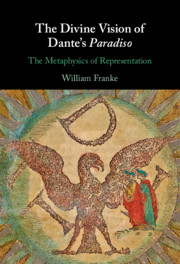Book contents
- The Divine Vision of Dante’s Paradiso
- The Divine Vision of Dante’s Paradiso
- Copyright page
- Contents
- Figures
- Prologue
- Acknowledgments
- Note on Translations and Primary Source Editions
- Part I The Literary Vision
- Part II Philosophical Reflections
- Excursus I Writing and Visionary Immediacy: Mechanics and Mysticism of the Letter
- Excursus II Saussure and the Structuralist Idea of Language as a System of Differences
- Excursus III Temporalization and Transcendence of Time through Language
- Excursus IV Transcendental Reflection: Time Synthesis and the Role of the “I”
- Excursus V Unmanifest Wholeness of Sense: Language as Image of the Imageless
- Excursus VI Transcendentality of Language and the Language of the Other
- Appendix Paradiso XVIII. 70–136
- Index
Excursus I - Writing and Visionary Immediacy: Mechanics and Mysticism of the Letter
from Part II - Philosophical Reflections
Published online by Cambridge University Press: 26 August 2021
- The Divine Vision of Dante’s Paradiso
- The Divine Vision of Dante’s Paradiso
- Copyright page
- Contents
- Figures
- Prologue
- Acknowledgments
- Note on Translations and Primary Source Editions
- Part I The Literary Vision
- Part II Philosophical Reflections
- Excursus I Writing and Visionary Immediacy: Mechanics and Mysticism of the Letter
- Excursus II Saussure and the Structuralist Idea of Language as a System of Differences
- Excursus III Temporalization and Transcendence of Time through Language
- Excursus IV Transcendental Reflection: Time Synthesis and the Role of the “I”
- Excursus V Unmanifest Wholeness of Sense: Language as Image of the Imageless
- Excursus VI Transcendentality of Language and the Language of the Other
- Appendix Paradiso XVIII. 70–136
- Index
Summary
Tendencies inherent in language to amalgamation and to anatomization are placed in tension. The Name and the letter can become objects of vision and veneration in their own right in a quasi-cultic worship of writing. But Dante at the same time embraces a rational view of language in which meaning is produced mechanically by systematic differentiation. He lets these perspectives play suggestively with and against one another. He also stages the transition from oral to written culture and, correspondingly, the transfer of the mystique of the word from prophetic utterance or prolusion to artistic representation in visible form.
- Type
- Chapter
- Information
- The Divine Vision of Dante's ParadisoThe Metaphysics of Representation, pp. 191 - 198Publisher: Cambridge University PressPrint publication year: 2021

